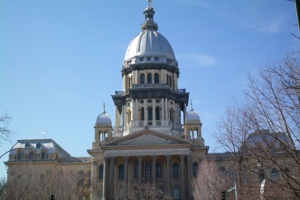
By Illinois Radio Network
SPRINGFIELD – Illinois’ industries are reacting to new U.S. Census Bureau data that shows Illinois led the nation in population loss over the past decade. The state lost nearly 160,000 residents in just six years, which could mean fewer members in Congress representing the Land of Lincoln.
Over the six consecutive years of population losses, the rate of decline accelerated year-to-year with more than 51,000 fewer people in the 12 months that ended July 1, 2019.
Illinois Chamber of Commerce CEO Todd Maisch said Illinois’ tax and labor policies are not friendly for businesses. While Maisch said they don’t get exit surveys when businesses leave, they do hear about the uncertainty businesses face in Illinois from things like a proposed progressive income tax.
“And [businesses] just say ‘I’ve got governors in other states and legislatures in other states that are really courting me and promising me stability and a successful future,’” Maisch said.
Illinoisans will get to vote on changing the state constitution’s flat income tax to a structure with higher rates for higher earners this November.
For farmers, Sangamon County Farm Bureau President Phil Sidles said they can’t just pick up their land and move it out of state.
“So when we lose that rural representation it is a concern of mine, and there’s fewer and fewer young farmers in the area so you’re going to see that representation shrink even more especially in the ag world,” Sidles said.
Demographers say it’s likely Illinois will lose one U.S. congressman, if not two, come the next reapportionment.
Illinois had 25 congressional districts in 1948, but lost a seat after the 1950 census. Today, there are 18 congressional seats. Illinois lost it’s 19th congressional seat in 2013 after the 2010 reapportionment. The next reapportionment will occur after the 2020 Census and before the 2022 elections.
If Illinois loses more congressional representation because it’s bleeding population to other states, U.S. Rep. Darin LaHood, R-Peoria, warns that will mean lost representation for rural areas.
“That concerns me long term is who’s standing up for agriculture, who’s standing up for our corn and soybean farmers, for crop insurance, our locks and dams,” Lahood said.
To reverse course, LaHood said state government needs reform.
“But again, focusing on a business climate on how do we keep illinois businesses here to thrive and prosper and do well and I think you do that with good economic policy,” LaHood said. “Listen, we have wonderful assets in this state, Illinois’ a great state but we haven’t had good governance and that’s what we need in this state.”
LaHood pushed for term limits and fair maps. While leader term limits are imposed on the Illinois Senate and House Republicans, House Democrats don’t have such a rule. Michael Madigan has been House speaker for all but two years since 1983. Proposals for a fair map amendment that would take redistricting out of the hands of politicians have gone nowhere at the statehouse.
Illinois Radio Network can be reached at [email protected].






